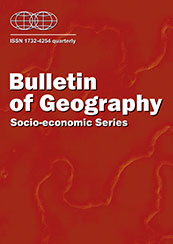Recycling of municipal waste in Slovak cities
DOI:
https://doi.org/10.2478/bog-2021-0022Keywords
waste management, municipal waste, recycling, cities, EU, SlovakiaAbstract
Among the most urgent topics within waste management policy is the gradual transition of the economy from a linear model towards a circular economy with a more sustainable way of using resources. The European Union has responded to these changes by passing new legislation and ambitious targets so that all member states can quickly work towards achieving a greener and more sustainable Europe. However, the starting position for achieving the desired goals differs significantly from one country to another. In this paper, we therefore looked at the position of Slovakia in relation to selected waste management indicators, and at the measures taken so far. Moreover, since waste management falls under one of the many public benefit services provided under the remit of local governments, we also monitored the specific contribution of Slovak cities to the newly established trend of waste management in the country.
References
Act no. 79/2015 on Waste and on Amendments to Certain Acts, as amended
Alwaeli, M. (2010). The impact of product charges and EU directives on the level of packaging waste recycling in Poland. Resources, Conservation and Recycling, 54(10): 609–614.
Anagnostopoulos, T. Kolomvatsos, K. Anagnostopoulos, C. Zaslavsky, A. Hadjiefthymiades, S. (2015). Assessing dynamic models for high priority waste collection in smart cities. Journal of Systems and Software, 110: 178–192.
Anghinolfi, D. Paolucci, M. Robba, M. Taramasso, A.C. (2013). A dynamic optimization model for solid waste recycling. Waste management, 33(2): 287–296.
Beigl, P. Lebersorger, S. Salhofer, S. (2008). Modelling municipal solid waste generation: A review. Waste management, 28(1): 200–214.
Bohm, R.A. Folz, D.H. Kinnaman, T.C. Podolsky, M.J. (2010). The costs of municipal waste and recycling programs. Resources. Conservation and Recycling, 54(11): 864–871.
Bolaane, B. (2006). Constraints to promoting people centred approaches in recycling. Habitat International, 30(4): 731–740.
Bor, Y.J. Chien, Y.L. Hsu, E. (2004). The market-incentive recycling system for waste packaging containers in Taiwan. Environmental Science & Policy, 7(6): 509–523.
Bosák, M. (2017). Municipal waste fee for western Slovakia - in the Bratislava region. Waste. 9/2017. A professional magazine for entrepreneurs, organizations, municipalities, state administration and citizens. 25-29.
COVID-19 reminded us of the sad reality of Slovak waste management. (4th year, 1/2020). Green Magazine. 10-13.
da Cruz, N.F. Ferreira, S. Cabral, M. Simões, P. Marques, R.C. (2014). Packaging waste recycling in Europe: is the industry paying for it?. Waste Management, 34(2): 298–308.
Directive 2008/98/EC of the European Parliament and of the Council of 19 November 2008 on waste and repealing certain Directives.
Circular economy: More recycling, less landfilling. press release. (18.4.2018). European Parliament news. Available at: https://www.europarl.europa.eu/news/sk/press-room/20180411IPR01518/obehove-hospodarstvo-viac-recyklacie-a-menej-skladkovania
Eurostat. Available at: https://ec.europa.eu/eurostat/web/main/home
Ferronato, N. Ragazzi, M. Portillo, M.A.G. Lizarazu, E.G.G. Viotti, P. Torretta, V. (2019). How to improve recycling rate in developing big cities: An integrated approach for assessing municipal solid waste collection and treatment scenarios. Environmental Development, 29: 94–110.
Grdic, Z.S. Nizic, M.K. Rudan, E. (2020). Circular economy concept in the context of economic development in EU countries. Sustainability, 12(7), 3060; 2-13.
Haško, D. (2010). Mandatory separation of municipal waste, how to deal with it. Waste. 2/2010. A professional magazine for entrepreneurs, organizations, municipalities, state administration and citizens: 10-11.
Kolekar, K.A. Hazra, T. Chakrabarty, S.N. (2017). Prediction of municipal solid waste generation for developing countries in temporal scale: A fuzzy inference system approach. Global NEST Journal, 19: 511–520.
Končálová, A. Dubcová, A. (2010). The position of waste management in the world and in the European Union. Geographical studies, 2/2010: 42-53.
Korhonen, J. Honkasalo, A. Seppälä, J. (2018). Circular economy: the concept and its limitations. Ecological economics, 143: 37–46.
Lewandowska, A. Szymańska, D. (2019). Municipal waste recycling in big cities in Poland in the context of ecologisation. Bulletin of Geography. Socio-economic Series, 43(43): 131-141, DOI: https://doi.org/10.2478/bog-2019-0009
Ministry of the Environment of the Slovak Republic. (2019). Strategy of the Environmental Policy of the Slovak Republic until 2030. Available at: https://www.minzp.sk/files/iep/03_vlastny_material_envirostrategia2030_def.pdf
Ministry of the Environment of the Slovak Republic (2018). Waste prevention program in the Slovak Republic for the years 2019-2025. Bratislava. Available at: https://www.minzp.sk/files/sekcia-enviromentalneho-hodnotenia-riadenia/odpady-a-obaly/registre-a-zoznamy/ppvo-sr-19-25.pdf
Pay-as-you-throw Toolkit for European Cities. Available at: https://www.operate.it/payt/
Pitoňáková, B. (2020). Sorting in composters is not taken into account, they criticize it. Available at: https://mypovazska.sme.sk/c/22309456/triedenie-v-komposteroch-sa-nezohladnuje-kritizuju-to.html (24. jan 2020).
Porter, R.C. (2002). The Economics of Waste. Washington: Resources for the Future. Routledge. Washington, DC.
Rigamonti, L. Sterpi, I. Grosso, M. (2016). Integrated municipal waste management systems: An indicator to assess their environmental and economic sustainability. Ecological indicators, 60: 1–7.
RISO. Regional information system on waste. Available at: http://cms.enviroportal.sk/odpady/verejne-informacie.php
Rusko, M. Hrabčák, M. (2014). Comparison of costs of selected towns and municipalities in Slovakia for waste management. Waste. 7/2014. A professional magazine for entrepreneurs, organizations, municipalities, state administration and citizens: 24-31.
Statistical office of the Slovak Republic. Available at: http://datacube.statistics.sk/
Stričík, M. Bačová, M. Čonková, M. Kršák, B. (2019). Sustainable municipal waste management. Technical University of Ostrava, Ostrava.
Struk, M. (2017). Distance and incentives matter: The separation of recyclable municipal waste. Resources, conservation and recycling, 122: 155–162.
Šimurka, P. (2020). Waste management at a crossroads. Enviromagazine. 2/2020, XXV. Professional-scientific magazine about the environment. P.19.
Štofová, L. (2017). Environmental and economic aspects of waste management. Waste. 9/2017. A professional magazine for entrepreneurs, organizations, municipalities, state administration and citizens: 11-14.
Zaman, A.U. (2016). A comprehensive study of the environmental and economic benefits of resource recovery from global waste management systems. Journal of cleaner production, 124: 41–50.
Downloads
Published
How to Cite
Issue
Section
License
Copyright (c) 2021 Bulletin of Geography. Socio-economic Series

This work is licensed under a Creative Commons Attribution-NonCommercial-NoDerivatives 4.0 International License.
Title, logo and layout of journal Bulletin of Geography. Socio-economic Series are reserved trademarks of Bulletin of Geography. Socio-economic Series.Stats
Number of views and downloads: 927
Number of citations: 1



